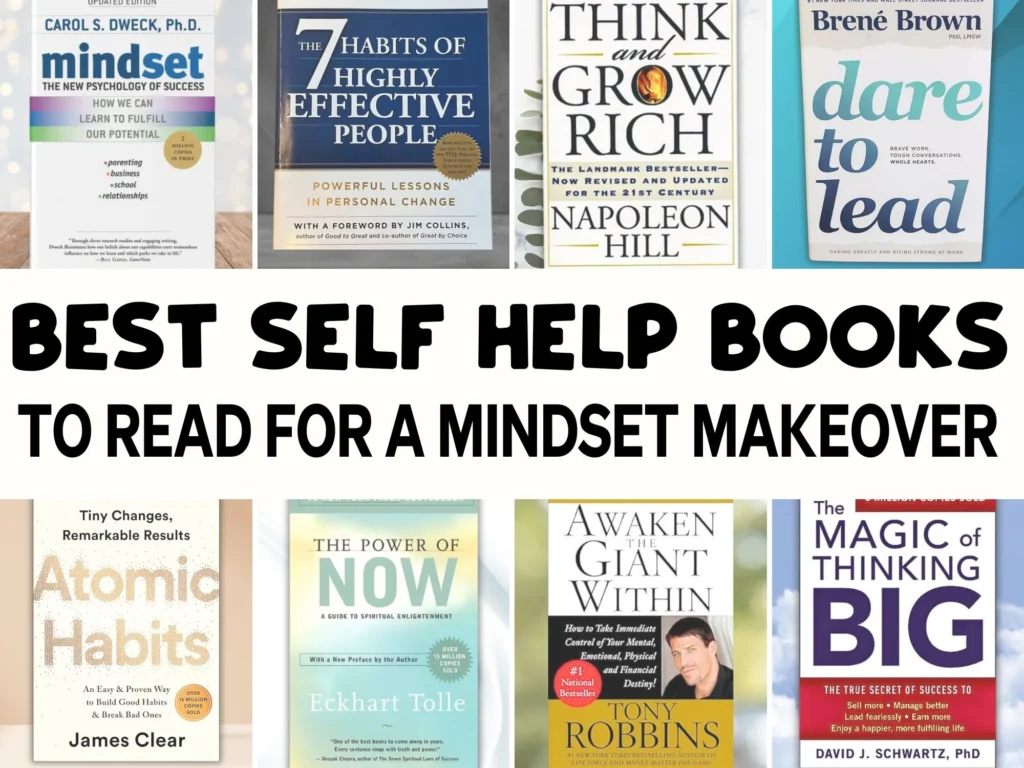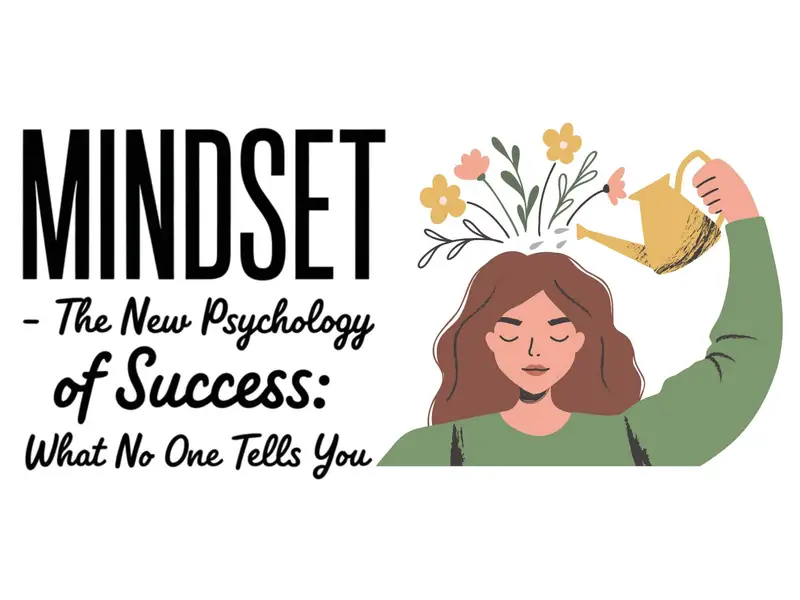Let’s be real—life can feel like a never-ending rollercoaster of stress, self-doubt, and why is everything so complicated? moments. That’s where self help books come in. Whether you want to build better habits, shift your mindset, or finally stop overthinking every little thing, the right book can be like a personal mentor guiding you toward success.
But with thousands of self-improvement books out there, which ones are actually worth your time? That’s exactly what we’re diving into today. From books that help you rewire your mindset to ones that make life less stressful, these 9 self-help books have the power to change the way you think, act, and live.
Ready? Let’s go.
Why Self-Help Books Matter More Than Ever
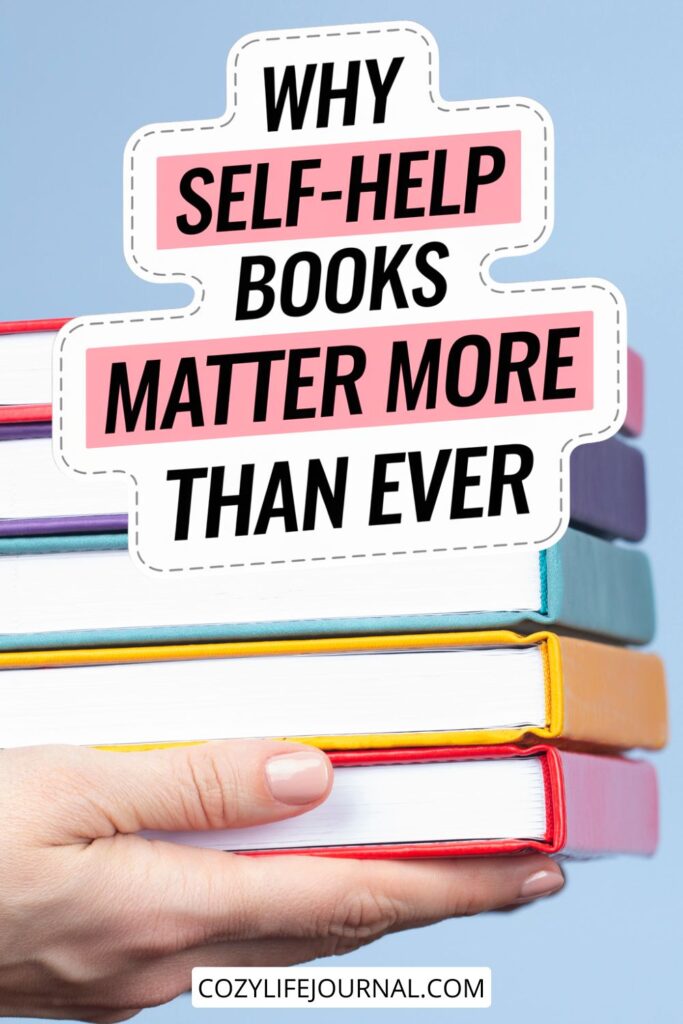
1. My Journey with Self-Help Books
There was a time in my life when I thought self-help books were just:
- Overhyped pep talks
- Feel-good mantras without real substance
- Books that promise the world but don’t deliver any real change
I’d roll my eyes whenever I saw someone say, “This book changed my life!” It all seemed too good to be true—until I reached a point where I needed something to actually change. Life felt like an endless cycle of:
- Stress and overthinking
- Falling into the same bad habits
- Feeling stuck and unsure how to move forward
That’s when I picked up The Power of Now by Eckhart Tolle. I wasn’t expecting much, but within a few pages, something clicked. For the first time, I realized:
✔️ Most of my stress came from worrying about the future or replaying the past.
✔️ The way I think shapes my reality.
✔️ I had more control over my mindset than I thought.
That one book led to another… and another… and soon, I was hooked. Over the years, self-help books have become my personal mentors. They’ve helped me:
✅ Shift my perspective
✅ Develop better habits
✅ Take action instead of just thinking about change
If you’ve ever felt stuck, unmotivated, or overwhelmed by life, trust me—there’s a book out there that can help. And today, I’m sharing 9 books that made a real difference in my life and can transform yours too.
2. The Skeptic’s Guide to Self-Help Books
I get it—self-help books don’t always have the best reputation. Some people think:
❌ They’re just motivational fluff.
❌ They all say the same things.
❌ Reading them doesn’t actually change anything.
And honestly? Some of that is true. Just reading a self-help book won’t magically make you more productive, confident, or successful. But here’s what I’ve learned:
✔️ The right book at the right time can completely shift your mindset.
✔️ The key isn’t just reading—it’s applying what you learn.
✔️ Small changes, when practiced consistently, can lead to massive results.
I’ve seen people read dozens of self-help books, nod in agreement at every chapter, and then go back to their old habits the next day. That’s because reading isn’t enough. The real transformation happens when you:
- Take action on what you learn
- Experiment with different strategies
- Find what works for you and commit to it
That’s why I’m not just listing great books—I’ll also show you:
✅ How each book shifted my perspective
✅ Practical takeaways you can apply to your own life
✅ Who will benefit the most from reading it
3. What to Expect from This List
This isn’t just another list of bestselling self-help books. I’ve carefully chosen these 9 because each of them tackles a different aspect of personal growth:
- 💡 Mindset shifts – Changing how you think about success and failure
- 📈 Productivity hacks – Building habits that actually stick
- 💰 Financial success – Mastering money and creating long-term wealth
- 💪 Emotional resilience – Overcoming fear, doubt, and self-sabotage
- 🔥 Personal motivation – Finding your why and staying inspired
- 🌿 Spiritual growth – Learning to live in the moment and embrace inner peace
Each book I’ll introduce isn’t just something I’ve read—it’s something I’ve used. I’ll share:
✔️ Why it resonated with me
✔️ How it helped me in real life
✔️ Who I think will benefit the most from reading it
So, if you’re ready to upgrade your mindset and take control of your life, let’s dive into the 9 self-help books that can change the way you think, act, and live.
1. Mindset: The New Psychology of Success – Carol S. Dweck
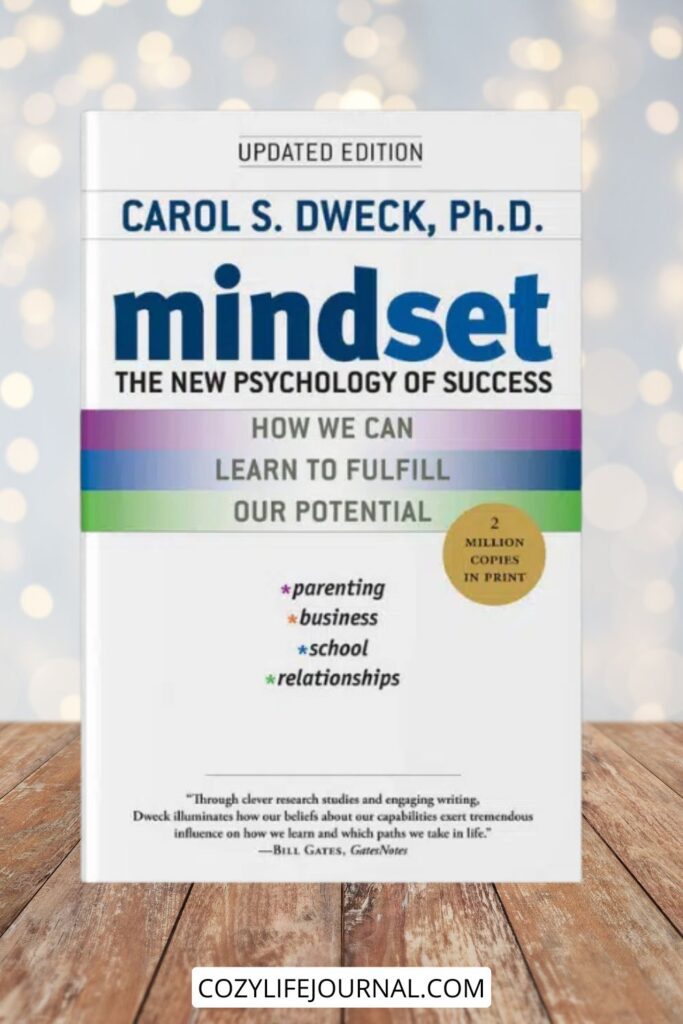
Why This Book is a Game-Changer
Ever felt like you’re just not good at something? Maybe you’ve said things like:
- “I’m just not a math person.”
- “I wasn’t born with a creative mind.”
- “Some people are naturally confident, and I’m not one of them.”
What if I told you that none of these statements are actually true? That’s exactly what Carol S. Dweck proves in Mindset, a book that completely reshaped how I view success, failure, and personal growth.
The Big Idea: Fixed Mindset vs. Growth Mindset
Dweck introduces two powerful mindsets that shape the way we approach challenges:
✔️ Fixed Mindset: Believing that intelligence, talent, and ability are set in stone. If you struggle with something, you assume you’re just not meant to be good at it.
✔️ Growth Mindset: Understanding that abilities can be developed through effort, learning, and persistence. Struggling isn’t failure—it’s part of the process.
This concept sounds simple, but when you really absorb it, it changes everything. Think about it:
- A fixed mindset says: “I failed, so I’m bad at this.”
- A growth mindset says: “I failed, which means I’m learning.”
When I first read this book, I had a massive realization: I had been living with a fixed mindset in so many areas of my life. I avoided things I wasn’t naturally good at because I hated the feeling of failure. But after applying Dweck’s principles, I started approaching challenges differently.
How This Book Helped Me
Before reading Mindset, I used to think:
❌ If I wasn’t naturally good at something, I should probably avoid it.
❌ Struggling with a skill meant I wasn’t talented enough.
❌ Smart people don’t fail—they just get it right away.
After finishing the book, I started:
✅ Trying things outside of my comfort zone, knowing I could improve.
✅ Viewing mistakes as lessons instead of personal flaws.
✅ Praising effort over talent—not just in myself, but in others too.
One of the biggest takeaways for me was how this applies to relationships, career, and even parenting. Dweck explains how praising effort instead of ability can completely transform a child’s confidence. Instead of saying, “You’re so smart!”, say, “You worked really hard on this!” It shifts the focus from natural talent to growth and persistence.
Who Should Read This Book?
This book is for you if you:
✔️ Feel stuck in a skill or area of life you think you’re just bad at
✔️ Struggle with self-doubt or fear of failure
✔️ Want to develop more resilience in the face of challenges
✔️ Are a parent, teacher, or leader looking to inspire a growth mindset in others
Practical Takeaways You Can Apply Right Now
1. Shift how you talk to yourself. Instead of saying, “I can’t do this,” add yet at the end: “I can’t do this… yet.”
2. Celebrate effort, not just results. Whether it’s in your own progress or when encouraging others, focus on the process.
3. Reframe failure as learning. Every mistake teaches you something. The only way to truly fail is to stop trying.
Mindset isn’t just a book—it’s a shift in perspective that can change the way you approach every challenge in life. Whether you’re looking to improve your skills, overcome self-doubt, or help others grow, this book will help you see failure as progress and effort as power.
2. The 7 Habits of Highly Effective People – Stephen R. Covey
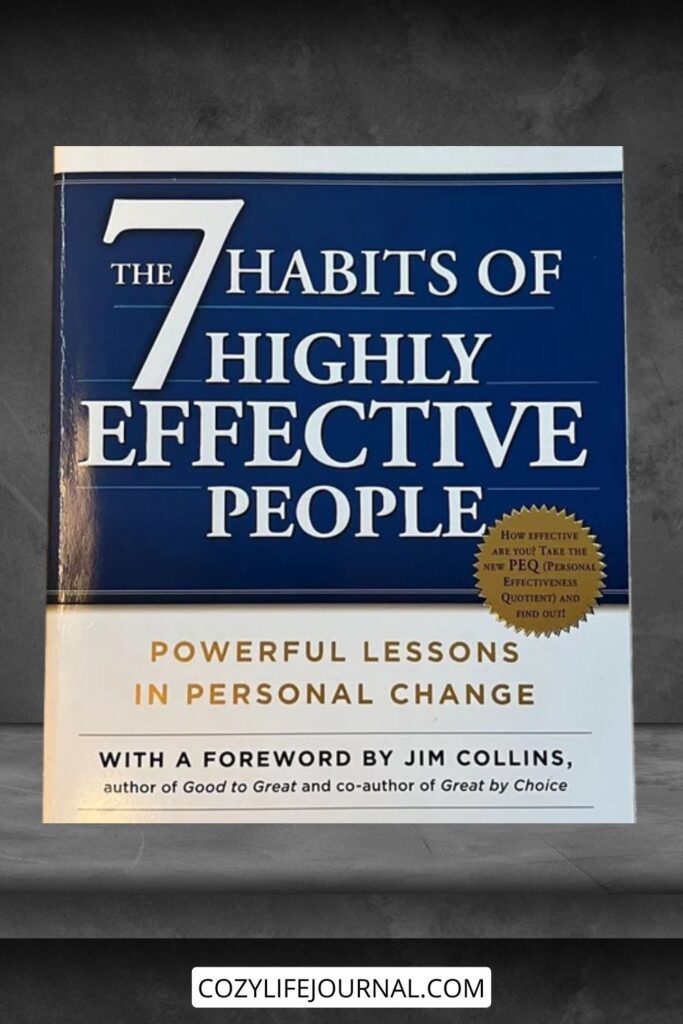
Why This Book is a Must-Read
Ever feel like you’re constantly busy but not actually getting anywhere? Like you’re checking off tasks, responding to emails, crossing things off your to-do list—but at the end of the day, you still feel stuck?
That was me before I read The 7 Habits of Highly Effective People. I thought productivity was about getting more done, but Covey taught me that real effectiveness is about focusing on what truly matters.
Instead of quick-fix life hacks, this book lays out a principle-driven approach to success that applies to:
- Career growth 🚀
- Relationships 💬
- Decision-making 🤔
- Personal discipline 🔥
It’s not just about being successful—it’s about becoming the kind of person who naturally attracts success.
The Core Message: It’s All About Habits
Covey doesn’t believe in overnight transformations. Instead, he focuses on long-term habit-building, because:
✔️ Your habits shape your decisions.
✔️ Your decisions shape your actions.
✔️ Your actions shape your life.
The book introduces 7 foundational habits that separate highly effective people from those who constantly struggle with distractions and wasted effort.
A Few Habits That Changed My Life
There’s a reason this book is a classic—the habits are timeless. Here are three that made a huge impact on me:
1️⃣ Be Proactive (Stop Blaming, Start Owning)
I used to be the person who said:
- “I don’t have time for this.”
- “I can’t control the situation.”
- “If only things were different…”
Covey made me realize that highly effective people don’t make excuses—they take ownership. Instead of focusing on what’s outside my control, I started focusing on what I could change. Game-changer.
2️⃣ Begin with the End in Mind (Define What Actually Matters)
One of the most powerful exercises in the book is imagining your own funeral. Morbid? Maybe. Eye-opening? Absolutely.
- What do you want people to remember you for?
- What kind of legacy do you want to leave behind?
- Are you spending your days in a way that aligns with your big picture?
Once I did this, I realized so much of my time was going toward things that didn’t actually matter to me. This habit helped me redefine success and prioritize what really counts.
3️⃣ Put First Things First (Time Management That Works)
Not all tasks are created equal. Covey’s Time Management Matrix helped me break free from the trap of feeling “productive” while actually just being “busy.”
- ✅ Important & Urgent → Deal with it immediately.
- ✅ Important but Not Urgent → Prioritize and schedule.
- 🚫 Not Important but Urgent → Delegate if possible.
- 🚫 Not Important & Not Urgent → Eliminate completely.
Before this, I was reacting to everything—emails, messages, random distractions. After applying this habit, I started choosing what to focus on, rather than letting my day get hijacked by “urgent” but unimportant tasks.
Who Needs This Book?
This book is for you if:
✔️ You constantly feel busy but don’t see real progress.
✔️ You struggle with time management and prioritization.
✔️ You want to be more intentional about your personal and professional growth.
✔️ You’re looking for a structured approach to self-improvement instead of random productivity hacks.
Key Takeaways You Can Apply Today
🔹 Say no more often. Every “yes” is a trade-off. Make sure you’re saying “yes” to the right things.
🔹 Think big-picture. Before taking on any task, ask yourself: Does this align with my long-term goals?
🔹 Pause before reacting. Instead of reacting emotionally to situations, take a moment to assess and choose your response.
Covey doesn’t just teach you how to be more productive—he teaches you how to live with purpose. It’s about building habits that set you up for success in every area of life. If you’re tired of spinning your wheels and want a proven framework for lasting change, this book is a must-read.
3. Think and Grow Rich – Napoleon Hill
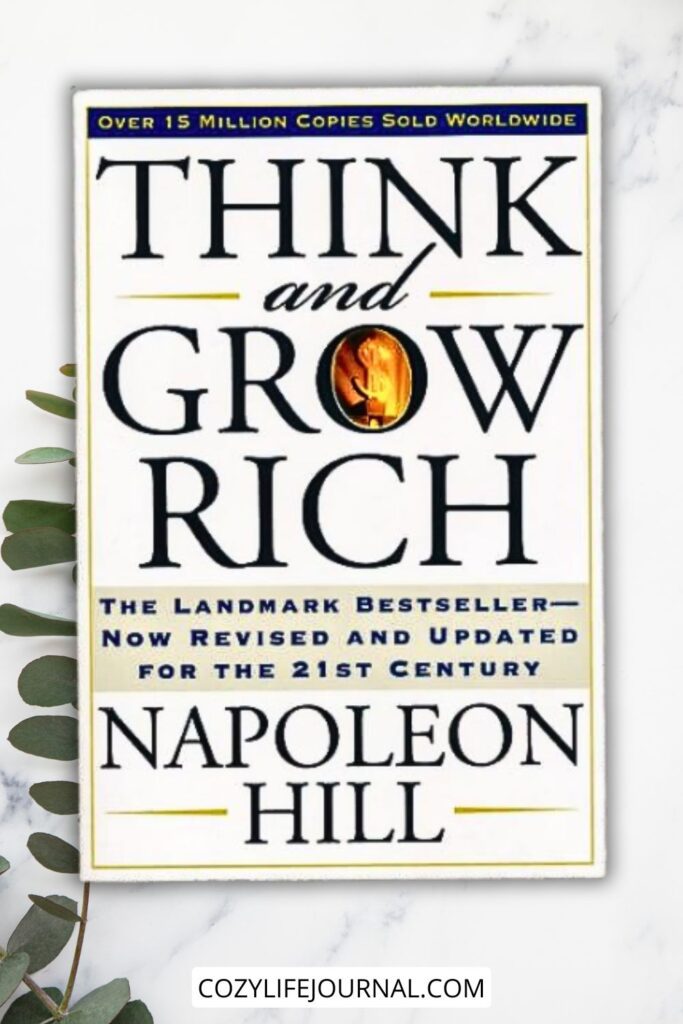
Why This Book Stands the Test of Time
Originally published in 1937, Think and Grow Rich has been around for nearly a century—and yet, its principles are still shaping the lives of entrepreneurs, CEOs, and success-driven individuals today. But here’s the catch: despite its title, this book isn’t just about making money.
At its core, this is a book about mindset. Hill spent 25 years studying the most successful people of his time—Henry Ford, Andrew Carnegie, Thomas Edison—and uncovered a powerful truth:
👉 Success isn’t about luck. It’s about thinking differently.
When I first picked up this book, I expected a guide on how to build wealth. Instead, I found a blueprint for achieving anything in life—financial or otherwise.
What Makes This Book Different?
Unlike other self-help books, Think and Grow Rich isn’t about quick hacks or strategies—it’s about rewiring your beliefs. Hill introduces 13 Principles of Success, but here are three that completely changed how I approach life:
🔥 1. Desire: The Starting Point of All Achievement
Sounds simple, right? But Hill doesn’t mean just wanting something—he means obsessing over it with a burning passion.
I used to think “It would be nice to be successful.” But after reading this book, I realized that truly successful people don’t just hope—they have an unshakable vision of what they want and a refusal to settle for anything less.
💡 Hill’s challenge: Write down exactly what you want and read it out loud every morning and night. The more you reinforce your goals, the more your subconscious starts believing they’re possible.
🧠 2. Autosuggestion: The Power of Self-Talk
This was a game-changer for me. Hill argues that your thoughts shape your reality, and he teaches a technique called autosuggestion—essentially, reprogramming your mind through deliberate self-talk.
🔹 Instead of saying: “I’m bad at this.”
🔹 Say: “I am constantly improving at this.”
🔹 Instead of: “I’ll never be successful.”
🔹 Say: “I am creating success every single day.”
At first, it felt silly. But after weeks of repeating affirmations, I noticed something: I actually started believing them. And once I believed them, I started acting accordingly.
🚀 3. Fear & Faith: The Two Opposing Forces
Hill explains that fear is the #1 thing holding us back from success. He identifies six main fears:
- Fear of poverty
- Fear of criticism
- Fear of ill health
- Fear of losing love
- Fear of old age
- Fear of death
When I read this list, I had to be honest with myself—how many times had I let fear stop me from going after something I wanted? Whether it was self-doubt, fear of failure, or worrying about what others would think, I realized my biggest roadblocks were always in my own mind.
💡 Hill’s advice: Replace fear with faith. Faith in yourself, faith in your abilities, and faith that if you stay persistent, success is inevitable.
How This Book Shifted My Perspective
Before reading Think and Grow Rich, I believed:
❌ Success depended on external factors—luck, connections, timing.
❌ Some people were just “naturally” confident and driven.
❌ If something didn’t work out quickly, it probably wasn’t meant to be.
After applying Hill’s principles, I learned:
✅ Success is an inner game first—your thoughts determine your actions.
✅ Confidence is built, not inherited.
✅ Persistence is what separates the successful from everyone else.
Who Should Read This Book?
This book is for you if:
✔️ You have big dreams but struggle with self-doubt.
✔️ You want to shift your mindset from scarcity to abundance.
✔️ You need motivation to push past fear and take action.
✔️ You want to learn the psychology of success from one of history’s greatest thinkers.
Key Lessons You Can Apply Today
✅ Create a vision statement. Write down exactly what you want and read it daily.
✅ Rewire your self-talk. Every negative thought should be challenged and replaced with a positive one.
✅ Face your fears head-on. Identify what’s holding you back and take small actions to push through it.
If you only take one thing from this book, let it be this: your mind is your most valuable asset. Train it, strengthen it, and watch how your life transforms.
4. The Magic of Thinking Big – David J. Schwartz
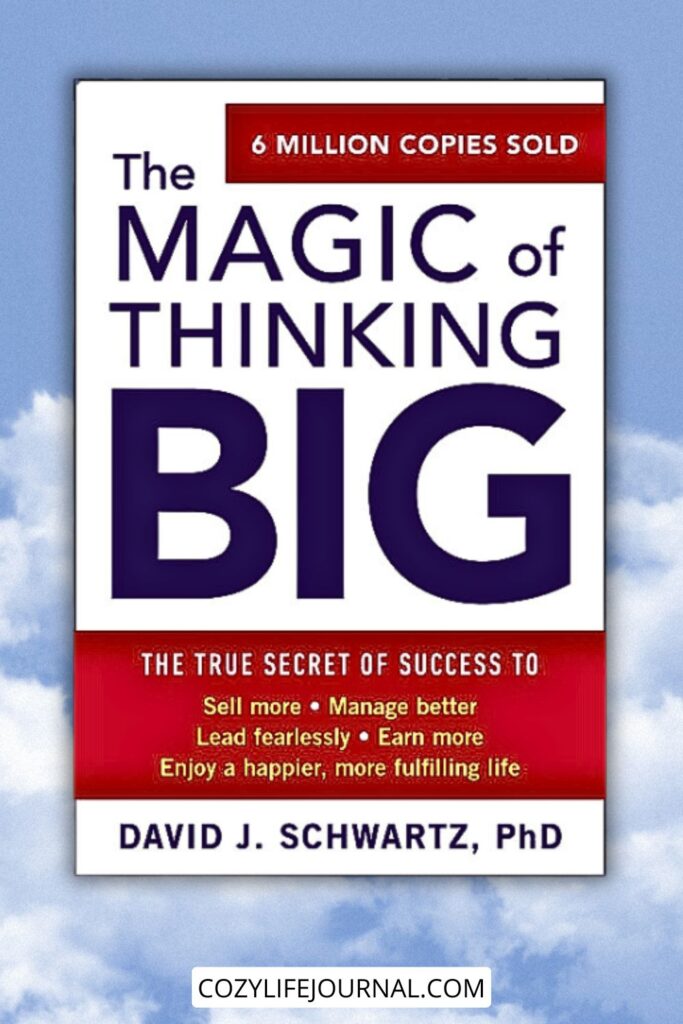
Why This Book is a Must-Read
Ever felt like you’re playing small in life? Maybe you’ve caught yourself saying things like:
- “I’m not smart enough for that.”
- “I could never start my own business.”
- “People like me don’t get those kinds of opportunities.”
If any of that sounds familiar, this book is for you.
David J. Schwartz’s The Magic of Thinking Big is all about shattering self-imposed limits and unlocking your full potential—not through luck or talent, but by changing the way you think.
When I read this book, it felt like someone had turned a light on in a dark room. It made me realize that the only thing standing between me and success was the way I saw myself.
The Core Message: Stop Settling for Less
Schwartz argues that most people underestimate their abilities and think too small. This book teaches you to:
✔️ Believe bigger—because success starts with self-confidence.
✔️ Act bigger—because taking small, hesitant steps won’t get you far.
✔️ Dream bigger—because if you aim for mediocrity, that’s exactly what you’ll get.
One of my favorite takeaways from this book is the idea that success isn’t reserved for the lucky few—it’s available to anyone who decides to go for it. The difference between those who succeed and those who don’t? Their mindset.
Lessons That Shifted My Perspective
🚀 1. Your Mind is Your Best Asset—Use It Wisely
Have you ever noticed how successful people radiate confidence? That’s because they think success before they achieve it.
Schwartz explains that your thoughts act like self-fulfilling prophecies. If you constantly tell yourself:
❌ “I’ll never get that promotion.”
❌ “I don’t have what it takes to start a business.”
❌ “I’m not talented enough to succeed.”
…then you’re already setting yourself up to fail.
🔹 New mindset: Start acting as if success is inevitable. Walk, talk, and think like someone who’s already achieved what they want. Your mind will follow suit.
🎯 2. Excuses Are Dream Killers—Eliminate Them
We all know that one person who has a reason for why they can’t do something. Maybe you’ve been that person—I know I have.
Schwartz calls this “Excusitis”—the disease of making excuses instead of taking action. The most common forms?
🔹 “I don’t have the time.” (But somehow, there’s time for Netflix and scrolling social media.)
🔹 “I’m not smart enough.” (Yet, intelligence isn’t a requirement—persistence is.)
🔹 “It’s too late for me to start.” (Colonel Sanders founded KFC at 65. Next excuse?)
The book challenges you to catch yourself making excuses and replace them with solutions.
🔥 3. Action Cures Fear—Start Before You’re Ready
One of the biggest aha! moments I had while reading this book was realizing how many times I let fear stop me from taking action.
- Afraid of public speaking? Speak up more in conversations.
- Nervous about launching a business? Take the first small step today.
- Worried about failing? Fail fast and learn faster.
💡 Biggest lesson: You don’t need to feel ready to start—you just need to start. The more you take action, the more confident you become.
Who Should Read This Book?
This book is for you if:
✔️ You feel stuck in self-doubt and limiting beliefs.
✔️ You struggle with procrastination and fear of failure.
✔️ You want to develop a mindset that attracts success.
✔️ You’re ready to dream bigger and take action.
Practical Takeaways You Can Apply Today
✅ Start thinking bigger. If your current goals don’t excite or scare you a little, they’re too small.
✅ Talk success. Speak with confidence, remove self-deprecating language, and uplift others.
✅ Take immediate action. Don’t wait until you feel ready—just start.
The Magic of Thinking Big isn’t about luck, talent, or privilege—it’s about developing the mindset that allows you to create a life beyond what you thought possible.
If you’re ready to start believing in your own potential, this book will show you how.
5. Awaken the Giant Within – Tony Robbins
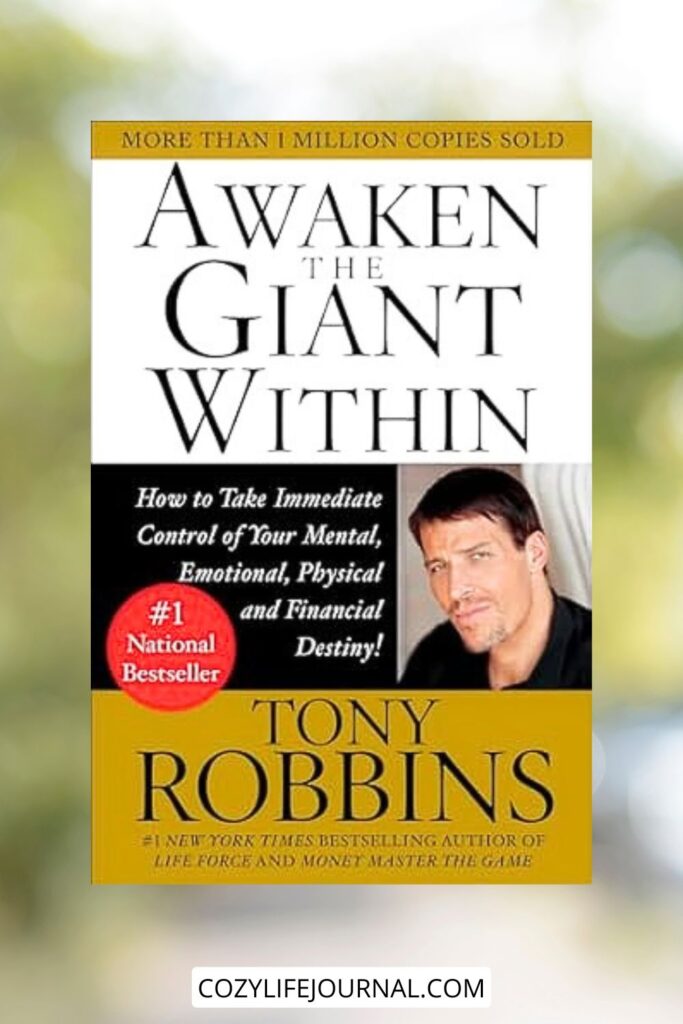
Why This Book Feels Like a Personal Pep Talk from Tony Himself
Ever wished you had someone shouting motivational wisdom at you while clapping their hands enthusiastically? Well, congratulations—you don’t have to buy a Tony Robbins seminar ticket for that experience. Just read Awaken the Giant Within, and you’ll feel like the man himself is right there, coaching you through life with an unshakable level of energy.
Here’s the deal: this book is not for the lazy. Tony doesn’t believe in waiting for the universe to send you a sign. His philosophy? Take action. Now. No excuses. No waiting. No whining.
When I picked up this book, I was hoping for a little motivation boost. Instead, I got a full-blown life intervention. Robbins doesn’t just inspire you—he pushes you to reprogram your mind, take control of your emotions, and design the life you actually want.
The Core Message: You Are in Control of Your Life (No, Seriously.)
If there’s one thing Tony Robbins wants you to understand, it’s this:
👉 Your life isn’t shaped by circumstances. It’s shaped by your decisions.
That’s right—according to Robbins, success, happiness, and even your mood on a Tuesday morning are all within your control. He lays out a blueprint for:
✔️ Rewiring your thoughts to create empowering beliefs
✔️ Mastering your emotions so they don’t control you
✔️ Making massive changes without waiting for the “right time”
(Hint: The right time does not exist. Start now.)
3 Lessons That Hit Me Like a Freight Train
🚀 1. Change Happens in an Instant—If You Decide It Does
Raise your hand if you’ve ever said, “I’ll start tomorrow.” 🙋♀️
Tony calls B.S. on this. He says change doesn’t take months or years—it happens the moment you decide.
🔹 You don’t need six months of prep to quit a bad habit.
🔹 You don’t need a perfect morning routine to start working out.
🔹 You don’t need to feel ready to pursue your dream.
Change happens the second you commit to it. No more waiting. Just go.
(So yes, this book may or may not have guilt-tripped me into finally starting that project I’d been putting off for…a while.)
🧠 2. Your Brain is a Drama Queen—Retrain It
Tony explains that your brain is like a search engine. If you type in:
❌ “Why do I always fail?” → Your brain will dig up every embarrassing moment from the past 10 years.
❌ “Why am I so bad at this?” → Your brain will find all the reasons you suck.
But what happens if you change the question?
✔️ “How can I turn this into a learning opportunity?” → Boom. Brain finds solutions.
✔️ “What’s one thing I can do to improve right now?” → Brain goes into problem-solving mode.
You are literally in control of how your mind reacts to challenges. Switch the script, and watch how your confidence and motivation skyrocket.
🔥 3. Raise Your Standards—Or Stay Stuck
Robbins says the secret to lasting change is upgrading your identity.
🚫 If you tell yourself, “I should work out more,” you probably won’t.
✅ But if you tell yourself, “I am the kind of person who takes care of my body,” you’ll show up differently.
🚫 If you say, “I should stop procrastinating,” nothing changes.
✅ But if you say, “I am someone who follows through on commitments,” you start acting like it.
Basically, Tony wants you to level up who you believe you are—because once you shift your identity, your actions will follow.
Who Should Read This Book?
This book is for you if:
✔️ You need a kick in the pants to stop waiting and start doing.
✔️ You want to ditch limiting beliefs and reprogram your mindset.
✔️ You’re tired of feeling stuck and need a serious mental reset.
✔️ You want to turn motivation into actual results.
(Warning: Side effects may include increased energy, sudden bursts of confidence, and an inability to tolerate your own excuses.)
Practical Takeaways You Can Apply Today
✅ Decide right now what you want to change—and commit to it. No waiting. No excuses. Just go.
✅ Upgrade your identity. Stop saying “I should” and start saying “I am the kind of person who…”
✅ Reframe negative thoughts. Ask yourself better questions and shift your focus from problems to solutions.
Tony Robbins doesn’t just want you to feel good—he wants you to take control and change your life. If you’re ready to stop overthinking, get out of your own way, and start living at a higher level, this book will light a fire under you.
6. The Power of Now – Eckhart Tolle
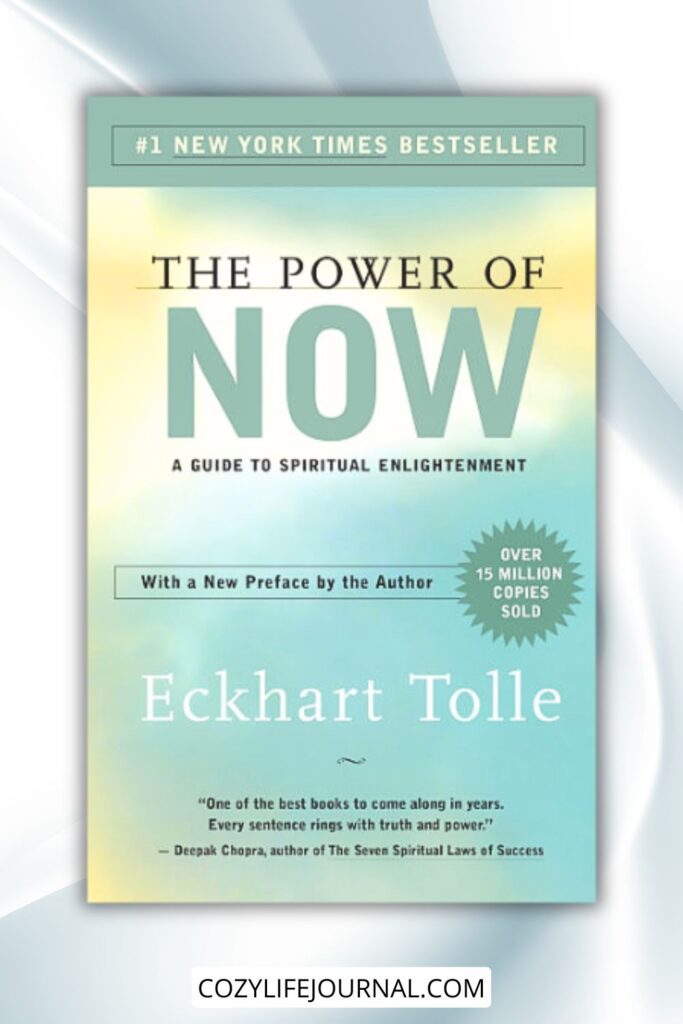
Why This Book Will Melt Your Overthinking Brain (In a Good Way)
Raise your hand if your brain is constantly playing mental gymnastics, jumping between:
- Worrying about the future (“What if everything goes wrong?”)
- Ruminating on the past (“Why did I say that in 2014?”)
- Trying to do a million things at once (but also getting nothing done)
Yeah. Same.
Then I read The Power of Now, and suddenly, it felt like Eckhart Tolle reached through the pages, grabbed me by the shoulders, and whispered:
👉 “Your entire life is happening in this moment. Stop missing it.”
Tolle’s book isn’t just about mindfulness—it’s about escaping the mental chaos we all live in and finally experiencing real peace. No, not the “I’m lying on a beach with a cocktail” kind of peace—the kind that sticks with you even when life is messy.
What This Book Taught Me (That I Wasn’t Ready to Hear at First)
🧘 1. Your Thoughts Are Not Reality (Yeah, Let That Sink In)
Here’s a fun fact: Your brain lies to you all the time.
Tolle explains that most of our suffering doesn’t come from what’s happening now—it comes from the stories we tell ourselves about it.
For example:
🚫 Reality: You made a mistake.
🚨 Brain: “You’re a failure, everyone will judge you, your life is over.”
😅 Actual Truth: You made a mistake. That’s it. Move on.
Once you realize your thoughts are just thoughts—not facts—you stop giving them so much power.
⏳ 2. The Present Moment Is the Only Thing That Exists
Tolle breaks it down like this:
❌ The past? Gone. Exists only in memories.
❌ The future? Not real yet. Only exists in your imagination.
✅ The present? The only thing that’s actually happening.
(Cue existential crisis.)
This hit me hard. I realized I was spending most of my life mentally checked out, worrying about things that weren’t even real yet.
Now, when I catch myself overthinking, I stop and ask:
- “Is this problem happening right now, or is it just in my head?”
- “Am I actually in danger, or is my brain just being dramatic?”
- “Can I actually do anything about this in this moment?”
Most of the time, the answer is no—which means I can stop worrying and just exist. (Mind-blowing, right?)
🕊️ 3. You Don’t Have to ‘Fix’ Yourself to Find Peace
This book isn’t about achieving happiness, success, or some kind of enlightenment. It’s about realizing that:
👉 You are already whole. Right now. Exactly as you are.
(I know, I know. My overachiever brain rejected this at first too.)
But Tolle teaches that peace doesn’t come from fixing yourself—it comes from accepting the present moment fully, without resistance.
This means:
✔️ You don’t need to wait until you “have your life together” to feel good.
✔️ You don’t need to overanalyze every problem—just deal with what’s in front of you.
✔️ You don’t need to control everything—because let’s be real, you can’t.
Once I started applying this, life got way less stressful. I still have goals, ambitions, and plans—but I’m not letting them steal the joy of right now.
Who Needs to Read This Book?
If any of these apply to you, grab this book ASAP:
✔️ You have anxiety, overthinking, or a PhD in worrying.
✔️ You struggle with letting go of the past or obsessing over the future.
✔️ You want to feel more peaceful, present, and grounded.
✔️ You’ve tried meditation but can’t sit still for more than 30 seconds.
(Warning: Side effects may include sudden moments of inner peace, reduced stress, and an inability to tolerate unnecessary drama.)
How to Apply This Book Right Now
✅ Practice “mini-mindfulness.” Stop once in a while and just notice your surroundings—what you see, hear, and feel in this exact moment.
✅ Question your thoughts. Next time your brain starts spiraling, ask: Is this actually real, or am I just freaking myself out?
✅ Pause before reacting. When something annoys you, take a breath before responding. (This alone has saved me from many regrettable emails.)
The Power of Now isn’t a book you just read—it’s a book you experience. If you’re ready to stop living in autopilot mode and actually enjoy your life as it’s happening, this book will change everything.
7. Atomic Habits – James Clear
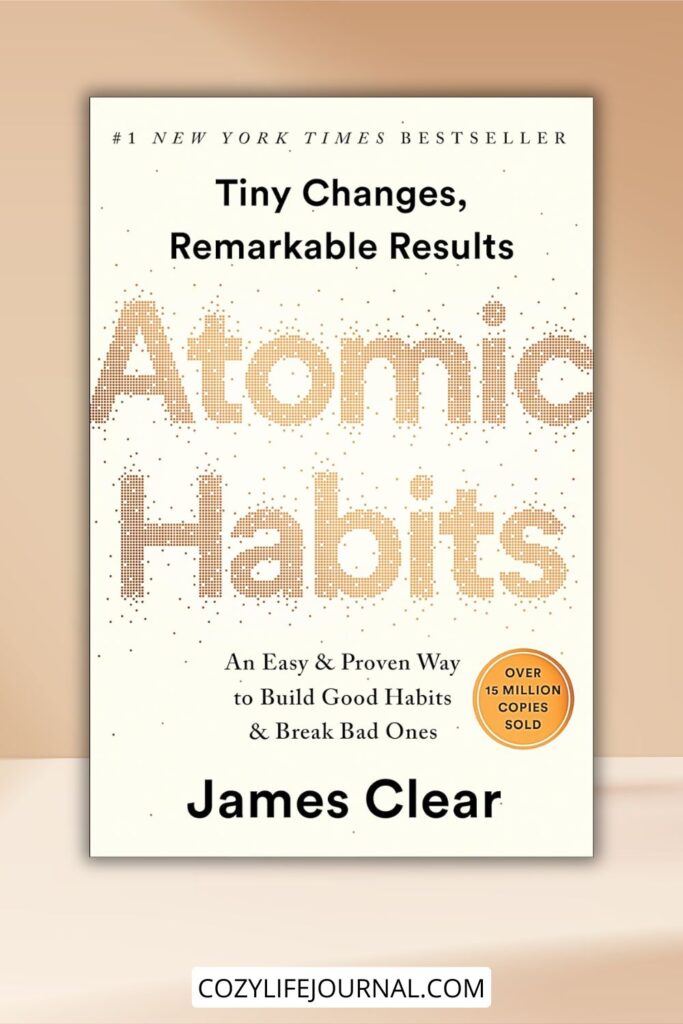
Why This Book Will Finally Make Your Good Habits Stick
Raise your hand if you’ve ever:
- Set a New Year’s resolution (and abandoned it by February).
- Promised yourself you’d wake up early (and then hit snooze 5 times).
- Bought a fancy planner to get organized (only to forget about it a week later).
Yep. Same.
Then I read Atomic Habits, and suddenly, I understood why my old approach to self-improvement wasn’t working. James Clear doesn’t just tell you to “try harder”—he gives you an actual system that makes habits stick (without requiring a complete personality overhaul).
This book taught me that success isn’t about willpower—it’s about tiny, consistent changes that add up over time.
The Core Message: Small Habits = Big Results
Most people think success comes from massive action—the “Go big or go home!” approach. But Clear argues that true transformation happens when you:
✔️ Focus on getting 1% better every day.
✔️ Build habits that fit into your existing routine.
✔️ Design your environment to make success easier.
It’s not about making huge, dramatic changes. It’s about making small, effortless tweaks that compound over time.
(Translation: You don’t have to overhaul your entire life—just start with tiny wins.)
Lessons That Made Me Reevaluate My Life Choices
🔄 1. Forget Goals—Focus on Systems Instead
This one blew my mind. We all set goals like:
❌ “I want to lose 20 pounds.”
❌ “I want to read more books.”
❌ “I want to be more productive.”
But here’s the problem: Goals don’t change your behavior—systems do.
💡 Instead of: “I want to get fit.”
✅ Focus on: “I will work out for 5 minutes every morning.”
💡 Instead of: “I want to read more.”
✅ Try: “I will read one page before bed.”
Tiny changes → Consistent action → Big results.
🧠 2. Identity-Based Habits: Become the Person You Want to Be
Want to build better habits? Stop focusing on the habit itself—start focusing on who you want to become.
🚫 Instead of saying: “I want to run a marathon.”
✅ Say: “I am the kind of person who runs every day.”
🚫 Instead of: “I want to eat healthier.”
✅ Say: “I am the kind of person who makes healthy choices.”
Your brain will start aligning your actions with your identity. And before you know it, the habit will feel natural.
(I may or may not have started calling myself “a morning person” just to trick myself into waking up earlier. Spoiler: It worked.)
🎯 3. Make Good Habits Easy & Bad Habits Hard
Clear has a genius trick for making habits effortless:
- Want to eat healthier? Put a bowl of fruit on the counter.
- Want to stop scrolling social media? Delete the app from your home screen.
- Want to work out more? Lay out your gym clothes the night before.
The easier you make a good habit, the more likely you are to stick with it. The harder you make a bad habit, the easier it is to quit.
(Which is why my phone now lives in another room after 9 PM—because I have zero self-control when it’s within reach.)
Who Needs to Read This Book?
This book is for you if:
✔️ You struggle with sticking to new habits.
✔️ You want to break bad habits without relying on willpower.
✔️ You’re tired of setting goals and not following through.
✔️ You want to build long-term success through tiny, sustainable changes.
(Warning: Side effects include suddenly becoming that productive, disciplined person you always admired.)
Practical Takeaways You Can Apply Today
✅ Shrink the habit. Instead of committing to a full workout, start with just one push-up. (Seriously, it works.)
✅ Stack your habits. Attach a new habit to something you already do. (Example: “After I brush my teeth, I’ll floss one tooth.”)
✅ Make it obvious. If you want to remember to drink water, leave a full glass on your desk. (Yes, it’s that simple.)
If you’ve ever struggled with sticking to good habits or breaking bad ones, Atomic Habits is a game-changer. James Clear doesn’t just tell you how to change—he gives you the science-backed roadmap to make it happen effortlessly.
8. Dare to Lead – Brené Brown
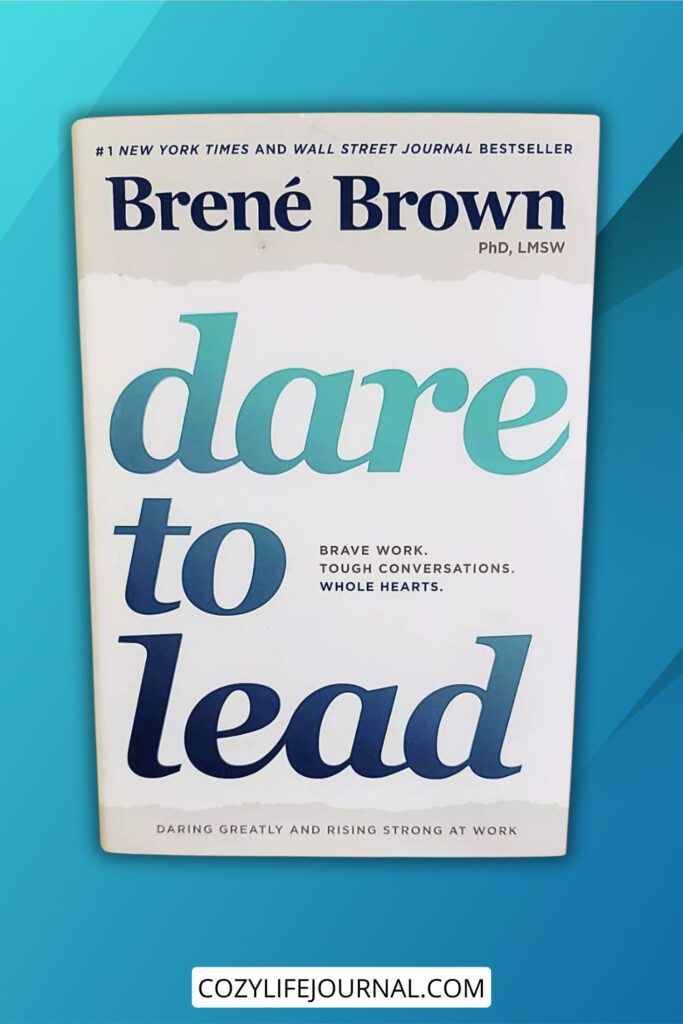
Why This Book Will Make You Rethink Leadership (And Life in General)
Let’s get one thing straight: leadership isn’t just for CEOs, managers, or people in suits giving TED Talks.
👉 If you’ve ever had to make a tough decision, speak up in a group, or guide someone through a challenge—congrats! You’re already leading.
But here’s the catch: most people think leadership is about being fearless, confident, and always knowing the answers. Brené Brown says that’s total nonsense.
Her book Dare to Lead flips the script on leadership and teaches something way more powerful:
💡 The best leaders aren’t the ones who pretend to have it all figured out—they’re the ones who lead with vulnerability, courage, and authenticity.
(Translation: You don’t have to be perfect to be a great leader. You just have to be real.)
The Core Message: Vulnerability = Strength, Not Weakness
We’ve all been trained to believe:
❌ “If you show emotions, people won’t take you seriously.”
❌ “Leaders have to be tough and unshakable.”
❌ “Asking for help makes you look weak.”
🚨 WRONG. 🚨
Brené Brown—who has spent two decades researching courage and vulnerability—discovered that:
✔️ The strongest leaders aren’t afraid to say, “I don’t know.”
✔️ The best teams are built on trust, not fear.
✔️ The most successful people embrace failure as part of growth.
(Cue my entire view of leadership crumbling and rebuilding in real time.)
3 Lessons That Made Me Want to Rethink How I Show Up in Life
💬 1. Clear Is Kind, Unclear Is Unkind
Raise your hand if you’ve ever avoided a hard conversation because you didn’t want to hurt someone’s feelings. 🙋♀️
Turns out, that’s not kindness—it’s avoidance.
- Telling someone “You’re doing fine” when they’re struggling? Unkind.
- Avoiding feedback because it’s uncomfortable? Unkind.
- Sugarcoating the truth instead of being upfront? Yep—also unkind.
The best leaders (and honestly, the best humans) are direct, honest, and clear—without being cruel.
(So yes, this book basically called me out on my “people-pleasing” tendencies and made me rethink how I communicate with others.)
🛑 2. Stop Armoring Up—People Can Spot Fake Confidence a Mile Away
You know that “leader” who always acts like they have everything under control? The one who never admits mistakes, always has the “right” answer, and looks like they walked straight out of a leadership manual?
🚨 NEWSFLASH: That’s not confidence. That’s fear wearing a power suit.
Brené explains that real leaders don’t pretend to be invincible—they’re the ones who say:
- “I made a mistake, and here’s what I learned.”
- “I don’t know the answer, but let’s figure it out together.”
- “I need help.”
(This book made me realize how often I’d been “armoring up” to appear strong when vulnerability would have actually made me a better leader—and a better person.)
🧠 3. Courage Over Comfort—Every. Single. Time.
Brené has this rule:
👉 If you’re faced with a choice between what’s easy and what’s right—choose courage.
- It’s easier to stay quiet than to speak up when something feels wrong.
- It’s easier to blame others than to take responsibility.
- It’s easier to play it safe than to take a risk on something you believe in.
But nothing great happens in the comfort zone. The best leaders, the best relationships, and the most fulfilling lives? They’re built by people who choose courage, even when it’s hard.
(Yes, this book also convinced me to stop avoiding difficult conversations and finally go after things I was scared to try.)
Who Needs to Read This Book?
This book is for you if:
✔️ You’ve ever struggled with speaking up, setting boundaries, or tough conversations.
✔️ You want to be a better leader, friend, or partner by showing up with more courage and honesty.
✔️ You’re tired of faking confidence and want to lead with real authenticity.
✔️ You know that fear holds you back, but you’re ready to start choosing courage instead.
(Warning: Side effects include newfound confidence, increased respect from others, and a sudden intolerance for fake leadership nonsense.)
Practical Takeaways You Can Apply Today
✅ Practice “rumbling”—instead of avoiding tough conversations, lean into them with honesty and curiosity.
✅ Ditch perfectionism. Next time you make a mistake, own it instead of trying to cover it up.
✅ Ask for help. Leadership isn’t about doing everything alone—it’s about creating a culture of trust.
If you’ve ever thought, “I’m not confident enough to be a leader”—this book will prove you wrong. Dare to Lead will teach you that the strongest people aren’t the ones who have it all together—they’re the ones who have the courage to be real.
9. The Four Agreements – Don Miguel Ruiz
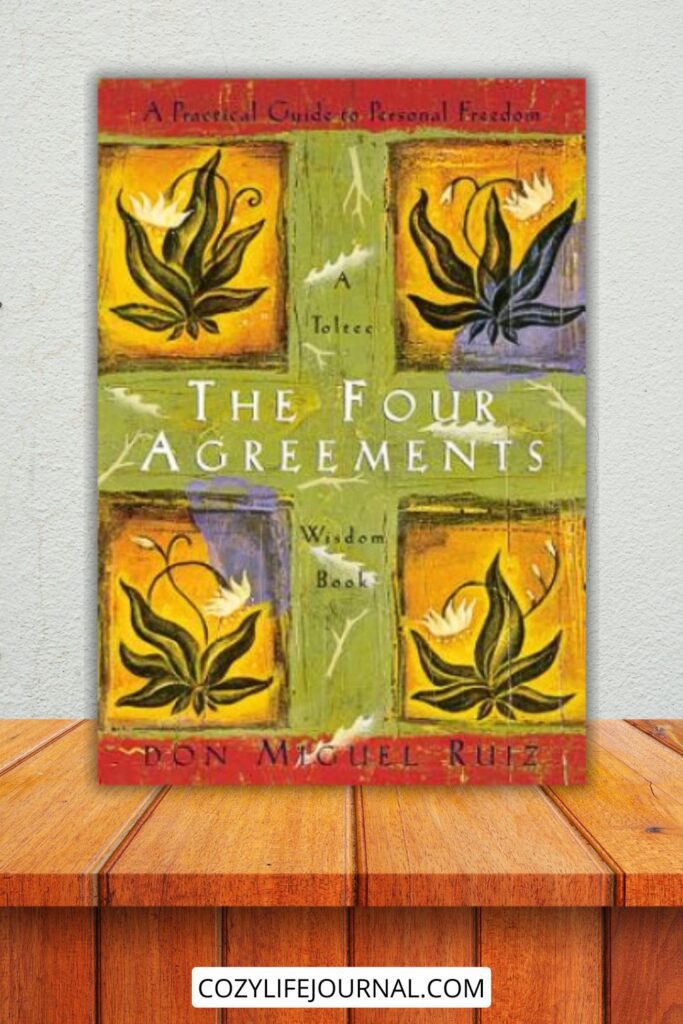
Why This Book Will Make Life Instantly Less Stressful
Ever feel like life is way more complicated than it needs to be? Like, why do we overthink every conversation, take things personally, and spend so much energy worrying about what others think?
Don Miguel Ruiz has one answer: because we were conditioned that way.
👉 The Four Agreements is basically a mental reset button. It strips away all the unnecessary stress and drama by introducing four simple (but life-changing) rules for living with more peace, confidence, and clarity.
(Bonus: This book is short. No 500-page deep dive into philosophy—just straight-up wisdom you can start using immediately.)
The Core Message: Rewrite the “Rules” That Are Holding You Back
Ruiz explains that from childhood, we’re “programmed” by society, our families, and our experiences to believe things like:
❌ “I have to make everyone happy.”
❌ “I’m not good enough.”
❌ “What other people think of me is really important.”
But guess what? None of that is actually true. This book helps you break free from those limiting beliefs and replace them with four powerful new ones.
(Spoiler: When I first read these, I thought, “That’s too simple to work.” Then I actually tried them. Game-changer.)
The Four Agreements (and Why They’ll Change Your Life)
🗣️ 1. Be Impeccable with Your Word
Translation: Say what you mean. Mean what you say. Stop gossiping.
Most of us don’t realize how powerful our words are—especially the ones we say to ourselves.
🚫 Negative self-talk like “I’m so stupid”?
🚫 Trash-talking others out of insecurity?
🚫 Saying yes when you actually mean no?
All of that drains your energy and creates unnecessary stress. Being “impeccable” with your word means speaking with honesty, integrity, and kindness.
(Fun fact: After reading this, I became painfully aware of how often I put myself down without realizing it. Time for a self-talk detox.)
🙅♀️ 2. Don’t Take Anything Personally
Oof. This one hit me hard.
Ruiz says that nothing other people do is actually about you—it’s about them.
- Someone snaps at you? They’re having a bad day—it’s not about you.
- Someone criticizes your work? That’s their perspective—not the ultimate truth.
- Someone doesn’t invite you somewhere? That’s their choice, not your worth.
💡 Realizing this is like unlocking a superpower—suddenly, all the things that used to stress you out lose their grip.
(Would’ve been nice to know this in high school instead of overanalyzing every conversation for three days.)
🕊️ 3. Don’t Make Assumptions
Ah yes, the Olympic sport of overthinking:
- “They didn’t text back. Are they mad at me?”
- “My boss just sighed. Am I about to get fired?”
- “That person looked at me weird. Do I have something on my face?”
Ruiz says assumptions create unnecessary suffering. Instead of guessing, just ask questions and communicate clearly.
✔️ Instead of assuming someone’s upset, ask them.
✔️ Instead of overthinking a text, send a follow-up.
✔️ Instead of jumping to conclusions, seek clarity.
(This one alone saved me from many imaginary arguments in my head.)
💯 4. Always Do Your Best
But here’s the catch: your “best” will change every day.
- Some days, your best will be 10/10 crushing it at work.
- Other days, your best will be getting out of bed and surviving the day.
And both are okay.
The key is to show up fully with whatever you have that day—without beating yourself up. When you know you gave your best (even if it wasn’t perfect), you can let go of guilt, regret, and self-judgment.
(As a recovering perfectionist, this one was a big sigh of relief.)
Who Needs to Read This Book?
This book is for you if:
✔️ You overthink everything and need a mental detox.
✔️ You take things personally and want to stop caring so much about others’ opinions.
✔️ You struggle with self-doubt, negative self-talk, or assumptions.
✔️ You just want less stress and more peace in your daily life.
(Warning: Side effects include sudden emotional freedom, increased confidence, and fewer imaginary arguments in the shower.)
Practical Takeaways You Can Apply Today
✅ Watch your words. Speak positively—especially about yourself.
✅ Stop assuming. If something’s unclear, ask.
✅ Let things go. What others do is not about you.
✅ Do your best—but be kind to yourself when your best looks different every day.
If you’re tired of unnecessary stress, drama, and self-doubt, The Four Agreements is like a mental detox for your soul. It teaches you how to live with more confidence, clarity, and peace—without overcomplicating things.
Final Conclusion: What’s Next?
So there you have it—9 self-help books that can completely transform your mindset, habits, and success.
But here’s the real question: Which one are you actually going to read first?
👉 If you want to ditch limiting beliefs and unlock your potential, start with Mindset.
👉 If you want to break bad habits and build better ones, grab Atomic Habits.
👉 If you need a wake-up call to start taking action, Awaken the Giant Within is waiting for you.
👉 If you’re constantly overthinking everything, The Power of Now will help you breathe again.
(Hint: It doesn’t matter which one you start with—just pick one, and take action.)
Because at the end of the day, reading self-help books won’t change your life.
👉 Applying what you learn will.
(And now, if you’ll excuse me, I have some habit-stacking, growth mindset-ing, and courage-building to do.)

